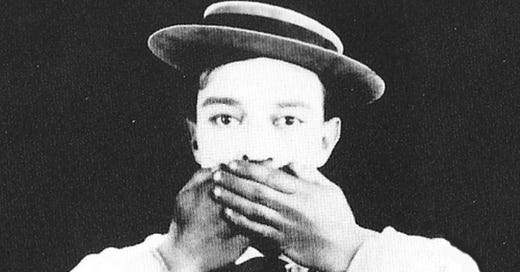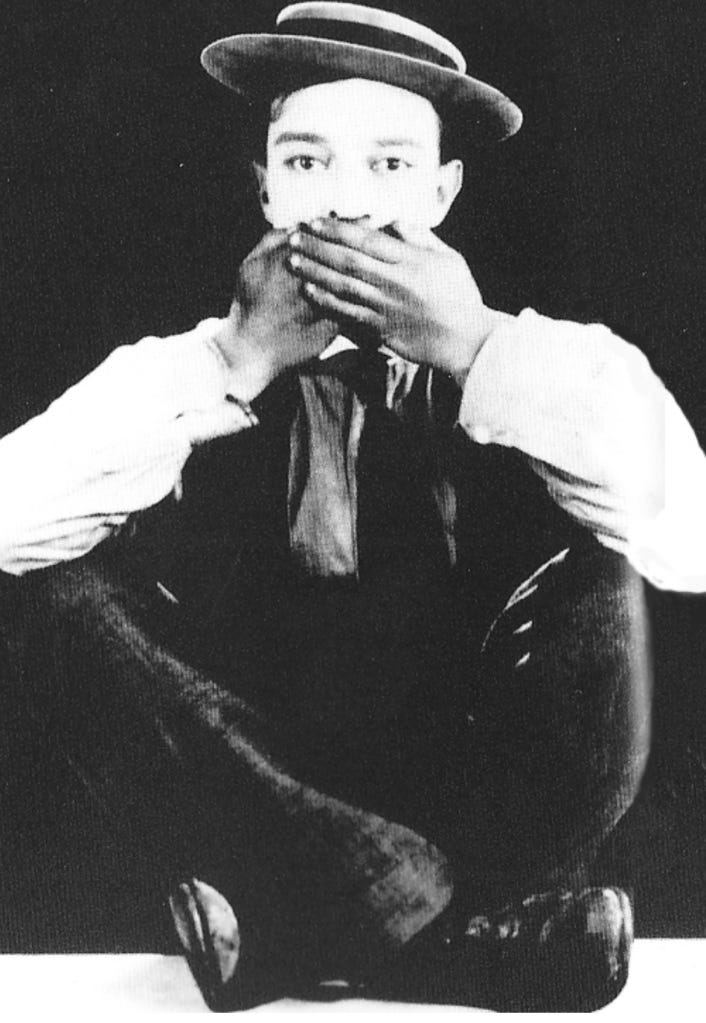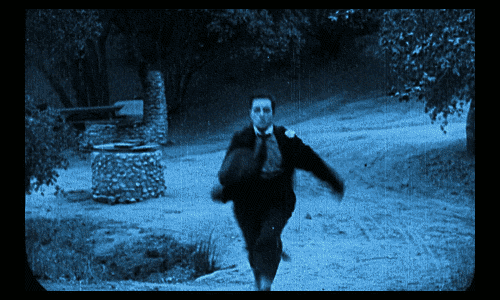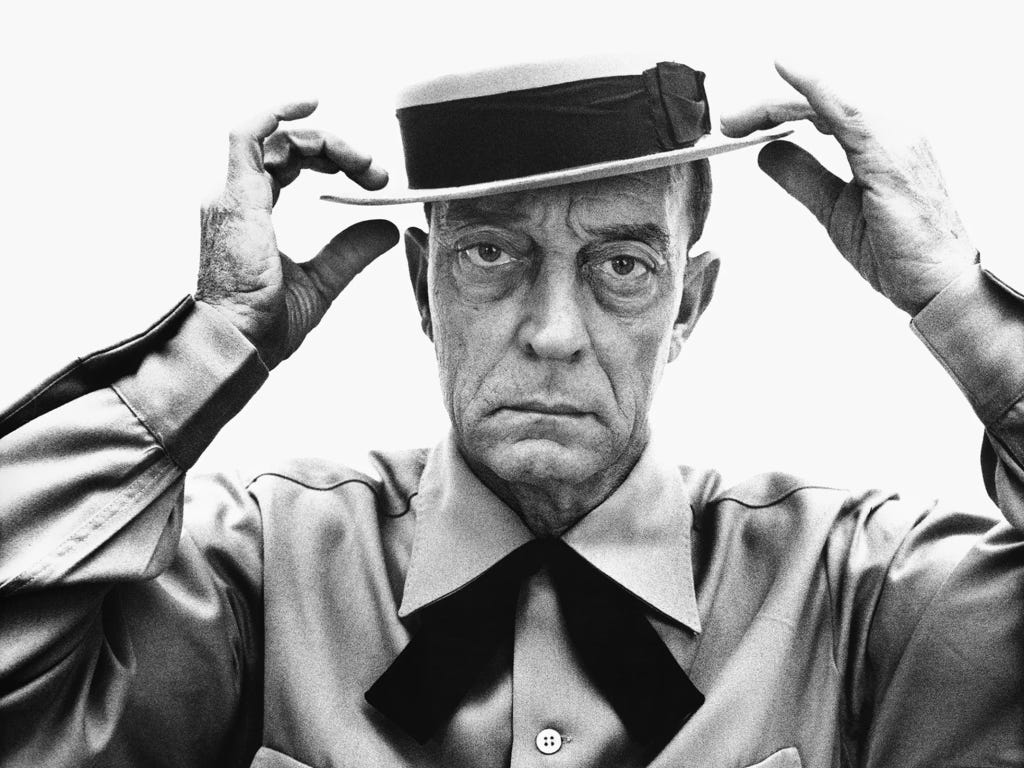Buster Keaton: The Silent Clown
Early life
Buster Keaton was born into the life of an entertainer. Both of his parents were part of a vaudeville theatre and he, naturally joined them.
It was doing his act with his parents that Buster learned how to be a great comic performer. He was reportedly told by his father that no one wants to see someone try to fall over or overact, so he learned to do his act with a straight face on, therefore becoming known as the ‘The Great Stone Face’.
However, Buster learned to do his physical stunts, including falling over and taking hits, also through this act. This is where things get tricky. Buster, as a child, through no imagination was abused by his parents who would make him do all of the stunts that he did, and would get hurt doing them. The reason why this is tricky is because Buster Keaton has said that he never got bruises or broken bones from this, and was happy. However, as time went on, things did start to get increasingly dangerous as Buster’s father became an alcoholic, and a dangerous one. It was at this point that both Buster and his mother left the act.
It is also known that the Keaton act became significantly more successful after Buster joined. He seemed to be able to make any stunt work and managed to develop a natural act of seemingly not caring nor dazed from the falls.
Films with Roscoe Arbuckle
After Buster Keaton quit the vaudeville act, he got his break in film. This was where his fame took off.
It was apparently a chance encounter that led to this, where Lou Anger introduced Buster Keaton to Roscoe ‘Fatty’ Arbuckle. Arbuckle then got Buster to appear in his film The Butcher Boy which is the first film that Buster Keaton was in.
From here, Buster and Roscoe did many films together. Buster learned the art of film and how to use film to his advantage and to enhance all the stunts and gags that he would do.
In these Roscoe Arbuckle films, you can see Buster smiling more (although it is still a rare sight). These films also go from chaotic scenes that are highly influenced by Roscoe Arbuckle, to tighter films that rely more on clever scenes and events that demonstrates the growing influence of Buster Keaton.
In The Cook you can really see how Roscoe Arbuckle used setting to generate comedy. There are two main places (the restaurant and the beach) and nothing really happens outside of these places. The kitchen part is also reminiscent of the chaotic Roscoe Arbuckle style.
After these films together, Buster went solo and Arbuckle was going to, in the future, sign a contract with Paramount that would boost his career even further.
However, Roscoe Arbuckle met an abrupt end to his career after he was accused of raping the actress Virginia Rappe which led to her death. His career was over and despite being declared innocent in his third trial, he would never return to the success that he had before.
The story goes that Roscoe Arbuckle attended a party and that Virginia Rappe was also there. It was aslo known that she felt sick and apparently went to Arbuckle’s bathroom. Arbuckle apparently found her there and went to get help. However, nothing about this case is simple. What is known is that Rappe died of an exploded bladder shortly after, everyone was drunk and that Maude Delmont said that Arbuckle had raped Rappe that he led to her death.
What makes the case difficult to know what is the correct story is that there are so many problems with the cases and witness. Delmont herself had a criminal history which included blackmail and many changed their original story to place Arbuckle in even more trouble. Arbuckle though, also changed his statement when he left out crucial information later in the trial.
What makes this even more difficult is the backdrop. This was (I may be wrong) the first big scandal to hit Hollywood. The newspapers spread the trail around as if it were a film that they were telling people about. Another factor to consider at the same time is that around this time (and sadly continued (and could be argued to still be present) for ages after in Hollywood) Hollywood was highly sexist. I can’t help but think about whether this had any impact on the case at all, or at least on public reception. I have to think about the questions like, would a male witness have been as mistrusted as Delmont, even if the crimes previously committed were the same? Hopefully the answer would be that they should be treated the same, but I can’t help the doubting part of my brain over this issue.
What this ultimately comes down to is how the public received this. Ultimately it didn’t seem to matter if he actually did it, his public image was so destroyed by the connotations of this, that he could never recover from this.
Solo career
Buster Keaton’s first film (in his solo career) was the wonderful One Week which follows him and his leading lady Sybil Seely trying to build a flat-pack house and running into difficulties.
In this film, you can see the trademarks of a Buster Keaton film. You have the controlled setting, the cleverness of the stunts and the mastering of the ‘Great Stone Face’ persona. Buster Keaton has been described as one of the greatest actors of all time, and I have to agree. Although he doesn’t show emotion through his mouth as most people do, he conveys so much through his eyes. To me, this is a greater acting ability than anything else. I also think that by being able to look into his eyes and see his emotion, the audience feel a much stronger connection to him. This is what makes this, and his following films, so compelling and enjoyable.
The films of his that I have enjoyed most are his earlier ones, that tend to focus more on a single plot and feature Buster more heavily. I really enjoyed watching The Haunted House (), The Goat () and The Blacksmith () which only really follow Buster. There is just so much enjoyment that can be taken out by watching Buster work and do all the stunts and gags so well.
This might be one of the reasons why, although I have to stress that I do still really like these slightly later films, I don’t enjoy the later films as much. I love that they got more ambitious with the plot and the films possibly got technically better. However, from what I have seen, Buster shares more screen time with other people and I feel like we lose something when we see other characters and not Buster.
Buster Keaton didn’t only do shorts though. I haven’t watched any of his feature films yet but I would love to. One of his most famous films was Sherlock Jr. () which runs at about 45 minutes. He is also well known for doing the films Steamboat Bill, Jr. () and The General (). In these films, Buster was allowed to showcase more plot and story in the films and his ability to do this through minimal inter titles.
Often in these films, Buster Keaton covered problems and themes that were rooted in America at the time. Buster has covered poverty and self reliance, suicide, rabies and also the problem of police in America. Although he wasn’t the only one to do this, he did do this in many of his films, and did so (on the most part) effectively.
MGM
This part of Buster Keaton’s life is where things start to get truly sad.
Buster Keaton, when looking back and talking to people about these events, has said that signing the contract with MGM was,
The worst mistake of my life
Buster Keaton’s title for the chapter about this MGM contract in his autobiography called My Wonderful World of Slapstick.
Throughout Buster Keaton’s career, he had stuck with a man called Joseph Schenck who was an independent producer. He then told Buster that signing with MGM would not affect the way he made his films and that he would still have as much control over them as he had done.
Another reason why Joseph Schenck convinced Buster Keaton to sign with MGM is because his later films weren’t doing as well as his earlier films, and he saw that Buster may need to move to a bigger studio company to achieve that goal.
However, this soon proved to not be the case. Buster had to put up with doing what the studio wanted him to do, was given a group of writers to help write the films, despite Buster preferring to see where the story takes him in the middle. The first film that Buster Keaton did after signing with MGM was The Cameraman (). I have not watched this, but it is meant to be a mix of what the studio wanted and also allowing Buster to have some freedom. This is what makes this film slightly better and more like a Buster Keaton film than some of the later ones.
MGM was also reluctant to help Buster Keaton move from silent films to talkies. Apparently this was due to them wanting to prioritise other genres rather than the comedy silents.
Ending
Buster Keaton, after signing with MGM started to suffer with the lack of control that he had over his films. This sadly led him to taking to alcohol and (like his father) became an alcoholic.
Alcoholism is such a bad thing and such a sad thing to happen to anyone, but there is such a sadness to how Buster Keaton ended up becoming one. In all of his early films, you marvel at how clever and athletic he was which makes this downfall even worse.
However, he did seem to make a comeback which happened due to the emergence of TV and he became a beloved figure again.









